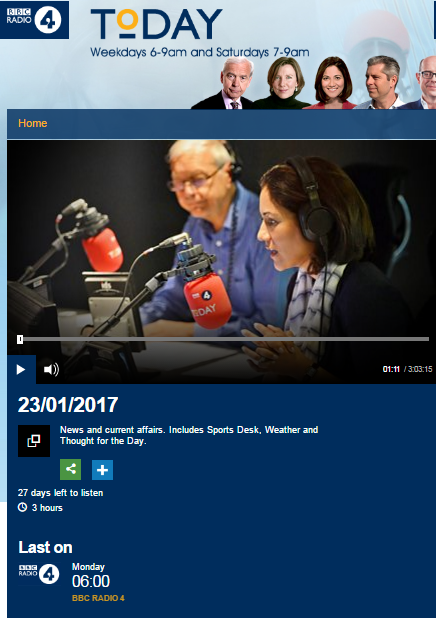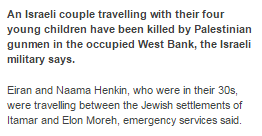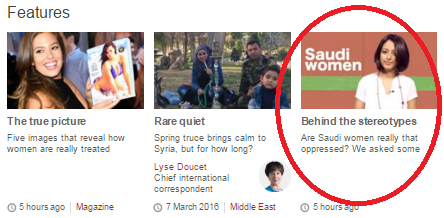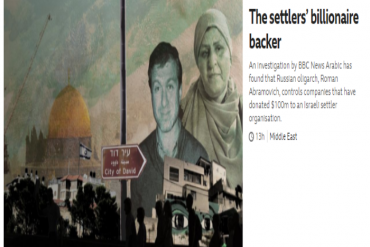Earlier this week the BBC Radio 4 ‘Today‘ programme conducted interviews with two members of the Israeli Knesset on consecutive days.
On January 23rd presenter Sarah Montague spoke with Deputy Foreign Minister Tzipi Hotovely (from 01:23:56 here), introducing the item as follows: [all emphasis in the original]
Montague: “Israel has approved the building of hundreds of new homes on land it has occupied in East Jerusalem. The settlements are illegal under international law, although Israel disputes that. The deputy mayor of the city, Meir Turgeman, is reported as saying since Donald Trump became US president, ‘now we can finally build’. Well, Tzipi Hotovely is Israel’s deputy minister of Foreign Affairs and a member of Likud party. Good morning to you.”
Hotovely: “Good morning”.
Montague: “Five hundred and sixty-six new homes approved in East Jerusalem on occupied land: are we going to see more settlement building now that President Obama is gone?”
Hotovely: “Well, this is not an occupied land. This is the Jewish land, forever, and I must say that every time this terminology is being used, I must say this is a political terminology; this is not legal terminology because according to international law, when you think about Judea & Samaria – look at the words: Judea – this is part of the Jewish heritage. Think about Jerusalem; the only capital that it was, it was of the Jewish people. So you can’t…”
Montague [interrupts]: “Of course it is only Israel’s interpretation of international law.”
Hotovely: “No, no. This is history. This is pure history because in international law and according [to] all the peace agreements that were signed, never said that Israel can’t build on Jewish land and this is definitely a Jewish land.”
Montague: “Of course, as I say, the majority of the rest of the world take a very different view but one thing that – clearly you think differently – but do you recognise that the building of these homes makes peace less likely?”
Hotovely: “Absolutely not. What we saw throughout last year is that every time Israel went through a process of concessions and when Israel committed disengagement from the Gaza [in] 2005, what we saw was more extremists on the other side. We saw Hamas regime taking over; terror regime that the Palestinians chose on a democratic vote. So what we saw is actually the opposite. When settlements were not there, instead of having democratic flourish in the Palestinian side, we just saw extremist radicalism and radical Islam taking over. Unfortunately…”
Montague [interrupts]: “You’re talking about a flourish…yes…you’re talking about flourishing of a particular one [laughs]…the…the…Israeli Jews in settlements; they are flourishing. Of course the Palestinians are not. I wonder, do you think that the idea of a two-state solution – because this is of course land that would have been Palestinian under the two-state solution – is the idea of that now dead?”
Hotovely: “Can you ask yourself how come, after 25 years that Israel said that it would [be] willing to give the Palestinians a Palestinian state, it never happened? Never in history when a minority wanted sovereignty it refuses to get the sovereignty. Now, the Palestinians are unique on this. When you see other minorities in the world that want to be independent, whenever they were offered the independency they said yes. The Palestinians are singling themselves out from this process – this historic process – because they said no to every international or Israeli offer, what [which] means that this is not what they really want. We see leadership that refuses to come and negotiate…”
Montague [interrupts]: “What…do you really believe…do you really believe that the Palestinians don’t want their own state?”
Hotovely: “Absolutely, because they said no to every Israeli offer and to every international offer. You can ask every American secretary of state that spend more time in the Middle East than in any other conflict and eventually, after so many years, so many offers, so many programmes…”
Montague [interrupts]: “What is it that you think…can I ask you, sorry…what is it you think they want if you don’t think they want their own state?”
Hotovely: “Well at the moment, unfortunately, they prefer Israel’s delegitimation [delegitimisation] than having a good life, than having sovereignty. They definitely don’t do any step in order to achieve any kind of agreement because when you want to reach an agreement you usually sit and negotiate. They refuse to negotiate for the last few years.”
Montague: “So settlements will continue and more settlements will be build [sic] on land that had… for decades has been considered to be the future Palestinian state?”
Hotovely: “Since 1967 this is a Jewish land as you know and of course when we build there…can you imagine that when….”
Montague [interrupts]: “Since Israel occupied it in 1967.”
Hotovely: “No. Israel was in a defend [defensive] war because after not accepting any kind of partition from the UN, from the beginning of the way the state [of Israel] has started, the Palestinians and other Arab states refused to accept the idea of a Jewish state in the Middle East and this is really the issue. I think that the international community…you know what? Let me quote Theresa May. Theresa May – your prime minister – said in a very clear voice that the settlements are not the main issue. And I think this should be the guiding line for the international community. Everyone has been dealing with the settlements even though everyone knows that the Palestinian…the PLO…was established in 1964 when there was not even one settlement…”
Montague [interrupts]: Tzipi…Miss Hotovely – the arrival of Donald Trump as American president; does it change the way that things operate in Israel between Israel and the Palestinians? Is this a game-changer?”
Hotovely: “First of all we think that we have a true friend in the White House. I think that all the declarations of the Trump administration were showing a deep friendship to Israel. They understand the complexity of the circumstances in the Middle East. The fact that in a world that everything is falling apart around us, when we see countries that are basically…are just not becoming countries anymore – we saw that in Syria, in Iraq, in Yemen all these circumstances that are creating more and more radicalism. When Israel keeps on being the only democratic regime in the region, they want to keep Israel in its best shape and I think….”
Motague [interrupts]: Tzipi Hotovely; we must leave it there. Thank you very much.”
Hotovely: “…we are very happy about the new administration.”
So what did audiences hear in this interview? They heard an Israeli MK interrupted at least seven times in a six minute-long interview. They heard Hotovely’s statements and positions challenged on numerous occasions – including Montague’s inaccurate claim that “only” Israel has a different “interpretation” of international law than the one promoted by the BBC.
Listeners also heard Montague twice inaccurately state that the area of land designated to a Palestinian state according to the two-state solution principle has already been fixed – with the added implication that negotiations on topics such as Jerusalem and borders are in fact superfluous.
And of course listeners heard Montague’s inappropriate editorialising in the form of the statement “Israeli Jews in settlements; they are flourishing. Of course the Palestinians are not” which clearly breaches editorial guidelines on impartiality.
The following day another Israeli MK – Haneen Zoabi of Balad – was interviewed on the same programme. In part two of this post we will be comparing that interview with this one.




